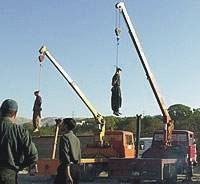Rights column
Darfur
UK
urged to back International Criminal Court investigation
Minority
Rights Group International (MRG) has called upon the UK
government to use the UN Security Council to refer war
crimes and crimes against humanity in Darfur to the International
Criminal Court (ICC) in The Hague. Reports have indicated
that the UK is considering supporting US preferences,
which may include a form of ad hoc tribunal such as those
used for Rwanda and former Yugoslavia, given long-standing
US opposition to the ICC. MRG states that such a move
would undermine the role of the ICC as the world's permanent
international criminal tribunal, a role that it was expressly
designed and empowered to undertake under the Rome Statute.
 Director
of MRG, stated: "The first act the UK Government
and other members of the Security Council should now take
is to resolve that the situation in Sudan be referred
to the Prosecutor at the International Criminal Court
in accordance with the report recommendation".
Director
of MRG, stated: "The first act the UK Government
and other members of the Security Council should now take
is to resolve that the situation in Sudan be referred
to the Prosecutor at the International Criminal Court
in accordance with the report recommendation".
The
UN Commission stated that it "strongly recommends
that the Security Council immediately refer the situation
of Darfur to the ICC, pursuant to article 13(b) of the
ICC Statute...serious violations of international human
rights law and humanitarian law by all parties are continuing.
The prosecution by the ICC of persons allegedly responsible
for the most serious crimes in Darfur would contribute
to the restoration of peace in the region". The Commission
clearly established that the Government of the Sudan and
the Janjaweed are responsible for violations amounting
to crimes under international law. In particular, the
Commission found that Government forces and militias conducted
indiscriminate attacks, including killing of civilians,
torture, enforced disappearances, destruction of villages,
rape and other forms of sexual violence, pillaging and
forced displacement, throughout Darfur.
MRG
criticised the US for its position on Darfur, which it
considers contradictory. The US called the situation genocide
as early as July 2004 and consistently called on the UN
to act decisively. However, it now seems prepared to block
one of the few potentially effective courses of action
that have been proposed so far, the prompt prosecution
by the ICC of those accused of planning and perpetrating
war crimes and crimes against humanity in Darfur. According
to MRG, such a move could have real effect in bringing
the crisis in Darfur to an end and as a deterrent against
further atrocities in the region. British envoy to the
UN, Sir Emyr Jones-Parry, has stated that the ICC is 'tailor-made'
to try the crimes detailed in the UN report.
"The
UN Security Council has responsibility for dealing with
the situation in Darfur, and as members of that body the
US and the UK governments should now accept the findings
of the Commission ", stated Lattimer.
Source:
Minority Rights Group.
Iran
No
more empty promises no more child executions
On
19 January 2005, Iranian authorities executed Iman Farokhi
for allegedly committing a crime when he was 17 years
old. The same day, an Iranian governmental delegation
in Geneva stated that Iran does not execute children under
the age of 18.
 The
Government of Iran has a history of stating that it does
not execute child offenders, but the facts tell a different
story.
The
Government of Iran has a history of stating that it does
not execute child offenders, but the facts tell a different
story.
Since
1990, 11 child offenders have been executed. Currently
there are at least 30 others awaiting execution. Among
them are Ali, Sattar, Vahid and Mohammad T, all children
under the age of 18.
Iran
is already a party to international conventions that prohibit
child executions, and for the last three years Iranian
authorities have been considering legislation that would
prohibit the use of the death penalty for offences committed
by persons under the age of 18. It is time for Iran to
make good on its international promises and stop child
executions.
Source:
Amnesty International